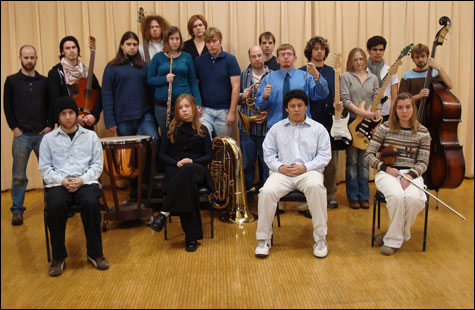
SERIOUS, NOT STODGY: USM's Composers Ensemble. |
This week two concerts will push the boundaries of genre and disrupt the concept of the stodgy classical performance. One group will even ask the audience to sing. On December 6 the University of Southern Maine Composers' Showcase will offer selections from new composers for eclectic ensembles, and on December 8 the Decompression Chamber Music Ensemble will offer an interactive concert pairing Robert Schumann with Philip Glass.
The USM Composers Ensemble is made up of players of an incredibly diverse collection of instruments. From typical orchestral instruments like violin, flute, and French horn, to instruments associated with rock like electric guitar, to musical theater-trained singers, these composers have put together works that push genre boundaries simply in their orchestration.
"This is a strange mini-orchestra," says concert organizer and USM composition professor Daniel Sonenberg. "But it forces students to be contemporary, to work across genres."
Each work is less than ten minutes long and many involve the entire ensemble. Some composers have created representative samples within the ensemble — such as a quartet made up of piano, flute, violin, and electric bass. The pieces include a musical-theater interpretation of the famous story of Tristan and Isolde, a piece involving the recorded sounds made in space by the Sun, Jupiter, and Saturn, and a mini-opera adaptation of one of Grimm's fairy tales.
"I don't like that word classical," says Sonenberg. "It puts this thing in a museum. We all imagine a certain thing when we go to a (classical) concert: Everyone is well behaved. We have to find a way to preserve the idea of art-music while functioning outside the traditional concert experience."
Sonenberg suggests that modern composers are beginning to truly think across genres. He explains that music that is not currently considered "art-music," or what some might consider classical music, is actually just as musically complex, just as challenging for the listener as what modern composers are doing in the classical genre. Sonenberg offers electronica musician Aphex Twin as an example.
"It's very timbre-y and carefully constructed. (Listening to Aphex Twin) is a similar kind of experience to listening to something like Bartok," explains Sonenberg. "We need to turn off the critical voice that responds to genres."
Like Sonenberg, the Decompression Chamber Music Ensemble wants to cross the previously held boundaries of well-behaved classical concerts and bring the audience something new. The ensemble perform hour-long lecture-concerts for the "rush-hour" crowd looking to decompress after a stressful day. The comfortable cafû at One Longfellow Square lends itself well to their goal.
"People can get a glass of wine and sit at the tables," says Priscilla Hayes Taylor, who heads up and performs in the group. "This feeds well into the idea of interacting with the audience."
In past concerts the musicians have explained complex rhythms by inviting the audience to clap along while they play or sing melodies to explain tonal shifts.
"It seems like every time I tell people I'm a musician, they say 'I'd really like to get into classical music, but I'm not sure how.' They feel like it doesn't belong to them. We aim to make a bridge, reach people, give them access and a way into the music," explains Hayes Taylor.